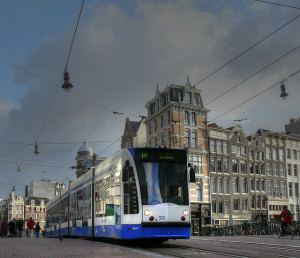1. car [noun] [de auto, de auto’s]
The word "auto" is short for "automobiel", which translates to "automobile" or "motorcar".
Phonetically, "auto" ends in a long "o" and in order to keep this sound the plural form is formed by adding ‘s (apostrophe s) instead of just a single s (which would turn the long "o" into a short "o").
Examples:
– "Het aantal auto’s in Nederland groeit."
("The number of cars in the Netherlands is growing.")
– "Nederlanders rijden meestal in handgeschakelde auto’s."
("The Dutch usually drive manual transmission cars" or "The Dutch usually drive stick". Literally: "…ride in hand-shifted cars.")
– "Frank zit in een midlife crisis en wil daarom een snellere en grotere auto."
("Frank is having midlife crisis and therefore wants a faster and bigger car." There is no real Dutch equivalent for "midlife crisis" so we use the same terminology used with "zitten in" (literally "to sit in").)
2. self- [in a compound]
Examples:
– "Automutilatie duidt vaak op ernstige psychische problemen."
("Self-mutilation often indicates serious psychological problems.")
– "Frank is autodidact op de gitaar."
("On the guitar, Frank is self-taught.")
Related words:
– "Wagen": wagon (often used as slang for "car").
– "Auto(snel)weg": motorway, highway.
– "Automaat": either an automatic car, or a vending/slot machine.

 The “tram” is a very common means of transportation in some of the bigger cities in The Netherlands. It is a vehicle, conducted through rails, for short distance transport of passengers, with a maximum speed of approximately 50 km/h.
The “tram” is a very common means of transportation in some of the bigger cities in The Netherlands. It is a vehicle, conducted through rails, for short distance transport of passengers, with a maximum speed of approximately 50 km/h.